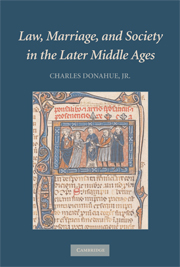Book contents
- Frontmatter
- Contents
- List of Tables
- List of Appendices
- Preface
- Acknowledgments
- Notes About This Book
- Introduction
- 1 The Background Rules and Institutions
- 2 Lying Witnesses and Social Reality: Four English Marriage Cases in the High Middle Ages
- 3 Statistics: The Court of York, 1300–1500
- 4 Story-Patterns in the Court of York in the Fourteenth Century
- 5 Story-Patterns in the Court of York in the Fifteenth Century
- 6 Ely
- 7 Paris
- 8 Cambrai and Brussels: The Courts and the Numbers
- 9 Cambrai and Brussels: The Content of the Sentences
- 10 Divorce a mensa et thoro and salvo iure thori (Separation)
- 11 Social Practice, Formal Rule, and the Medieval Canon Law of Incest
- 12 Broader Comparisons
- Epilogue and Conclusion
- Bibliography and Abbreviations
- Subject Index
- Texts and Commentary
- Table of Cases
- Table of Authorities
- Index of Persons and Places
2 - Lying Witnesses and Social Reality: Four English Marriage Cases in the High Middle Ages
Published online by Cambridge University Press: 14 July 2009
- Frontmatter
- Contents
- List of Tables
- List of Appendices
- Preface
- Acknowledgments
- Notes About This Book
- Introduction
- 1 The Background Rules and Institutions
- 2 Lying Witnesses and Social Reality: Four English Marriage Cases in the High Middle Ages
- 3 Statistics: The Court of York, 1300–1500
- 4 Story-Patterns in the Court of York in the Fourteenth Century
- 5 Story-Patterns in the Court of York in the Fifteenth Century
- 6 Ely
- 7 Paris
- 8 Cambrai and Brussels: The Courts and the Numbers
- 9 Cambrai and Brussels: The Content of the Sentences
- 10 Divorce a mensa et thoro and salvo iure thori (Separation)
- 11 Social Practice, Formal Rule, and the Medieval Canon Law of Incest
- 12 Broader Comparisons
- Epilogue and Conclusion
- Bibliography and Abbreviations
- Subject Index
- Texts and Commentary
- Table of Cases
- Table of Authorities
- Index of Persons and Places
Summary
Let us depart from the law as stated and ask about the law as applied. Our sources for this are annoyingly incomplete, nothing like what they are, for example, for the English central royal courts, but we do have substantial pieces of the picture, runs of records from various courts in various places at various times. The four cases I have chosen as examples are all typical of English marriage-formation cases. They differ from those on the Continent in ways that we will come to in later chapters. They differ from most of the other English cases only in that these examples have left particularly full records.
DOLLING C SMITH
In our first case, Alice Dolling appeared in the consistory court of Salisbury on 10 July 1271, claiming that William Smith was her husband. William denied the charge, and Alice was told to produce her witnesses before the rural dean of Amesbury (Wilts). In September, the depositions of her three witnesses were published in open court. In October, William confessed that he had had intercourse with Alice but denied that he had married her. He claimed that he had been in another town on the St Stephen's day (26 December), almost three years previously, the day on which Alice alleged that they exchanged the words of marital consent in Winterbourne Stoke (Wilts). The dean of Amesbury was to examine William's 10 witnesses.
- Type
- Chapter
- Information
- Law, Marriage, and Society in the Later Middle AgesArguments about Marriage in Five Courts, pp. 46 - 62Publisher: Cambridge University PressPrint publication year: 2008



